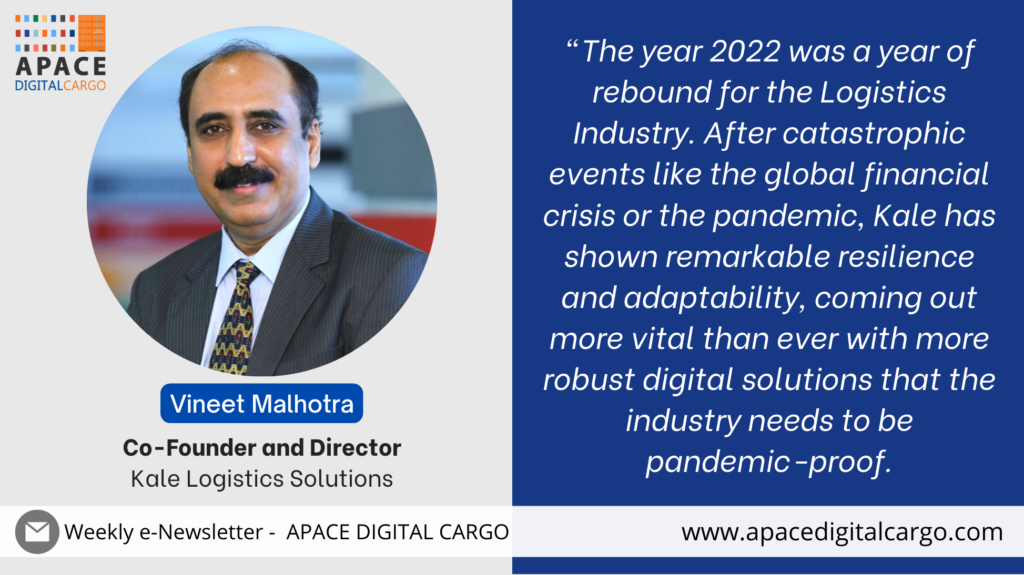
Continuing our #LogisticsTrends2023 series, we have insights from Vineet Malhotra who is the Co-Founder and Director of Kale Logistics Solutions. He believes that #sustainability is a legit trend in Logistics and the new phrase, technology led sustainability is apt for the logistics industry which is also the top most agenda topic of the boardrooms in the logistics industry. Here are the excerpts:
What was the greatest trend in the logistics industry in 2022 according to you?
This is no brainer – Digital Transformation and Sustainability. The world got together to collective fight the effects COVID 19 pandemic and the depleting environment. Sustainability is a legitimate trend in Logistics which is directly impacted from the deterioration taking place. The new phrase – technology-led sustainability is very apt for this industry. We have witnessed a multi-fold jump in tech adoption in the last 3 years. The year 2022 was a year of rebound for the Logistics Industry. After catastrophic events like the global financial crisis or the pandemic, Kale has shown remarkable resilience and adaptability, coming out more vital than ever with more robust digital solutions that the industry needs to be pandemic-proof. These events have accelerated digital adoption by large players and SMEs, making the global supply chain resilient and adding urgency to the sustainability imperative.
According to you, what are the milestones achieved for the industry in 2022?
There was a lot of impetus on standardisation of data exchange and documentation. We saw a collective effort from global bodies like IATA, IMO, TIACA, IAPH on data harmonisation. Air Cargo has proved to be the ‘Hero’ for Aviation Industry during the COVID pandemic. Cargo has proven to be a key revenue generator for global Airports in the chaos and duress of a worldwide pandemic. Now, the stage is set for Air Cargo to grow into the ascendant industry. In today’s world, we have seen the rapid enhancement of Airport cargo infrastructure, digital infrastructure for cargo handling, and the development of collaborative partnership models wherein all stakeholders manage cargo multilaterally.
National Logistics Policy of India 2022 is a significant milestone in India’s logistics journey.
As we engage with more than 100+ Airports and Ports across the world to simplify their technology landscape and strengthen their core by building a cloud-based digital foundation and embedding intelligent automation into their cargo operations, we are also on a mission to create the world’s largest Digital Logistics Cloud-Enabled Platform for the International Supply Chain. We have kept the innovation wheel churning, offering e-services to enterprises, and designed a Sea-Air Corridor for multi-modal cargo movement: introduced the Logistics e-Marketplace, Enterprise Logistics and Customs Control Tower.
With the digital transformation in the logistics industry, technology has reshaped the industry by increasing productivity in the supply chain and reducing costs and errors. What is your opinion and how will it take shape in 2023?
We see the Cargo Community Systems setting the digital transformation trend in Airports and Ports worldwide. CCS offers the true Air Cargo Single Window for current problems related to congestion, higher dwell times, paperwork, and supply chain transparency. Our customers have been extremely happy with the results these initiatives are producing across several locations. CCS gives the ability to supply chain stakeholders to “do more with less”, which is so helpful in situations where it is challenging to find skilled staff for the Logistics players; with the pandemic still present, CCS helps the industry operate in a safer environment by reducing congestion (social distancing) and paperwork (means of transmission of virus).
How do you see the government intervention in the sector? What are the expectations?
The launch of the National Logistics Policy in India by Prime Minister Narendra Modi is a bold step to reform the Logistics ecosystem in the country. The policy comprises reforms that could have a positive impact on the industry. IMO’s amendment to FAL mandate Maritime Single Window and the deadline to adhere by 01 January 2024 is another push from the regulatory body to make digitisation the new normal. Precisely, regulators and governments are paving the way forward. These mandates are unique in nature, and if pursued well, they could become game-changers for the entire ecosystem. For example, ULIP can improve India’s Ease of doing Business ranking and enable the industry players to create a market for revenue generation as well as the abolition of monopoly and un-levelled advantage. Achieving positive results at the granular and individual levels will have a tremendous constructive impact on the overall Logistics sector of the country.
Will sustainability be the trend for the industry?
Green logistics is the term that is getting very popular. This is driving a lot of policy making and is the top most agenda topic of the boardrooms in the logistics industry.
What is the Outlook 2023 for the logistics industry?
Cargo is the rising star and will continue to shine in the coming years. Cargo Community Systems, which connect the motley group of stakeholders in the Air and Maritime industry on a common platform, are changing the industry forever and for the better. These act as an accurate “Air Cargo Single Window” system that eliminates duplication of data entry (in the Air Cargo value chain, the same data gets entered at least six times, if not more), reduces unnecessary paperwork, addresses Airport congestion issues, enhances the security of the Air Cargo supply chain and bring the shipment visibility to all stakeholders. An Airport being an anchor of such a platform will transform the whole industry as the airport is a strong neutral player in the supply chain. In Kale’s estimates, the Air Cargo Community Systems can unlock a value of at least over $9Bn annually and save around 120,000 trees a year, thereby contributing to the environment.





